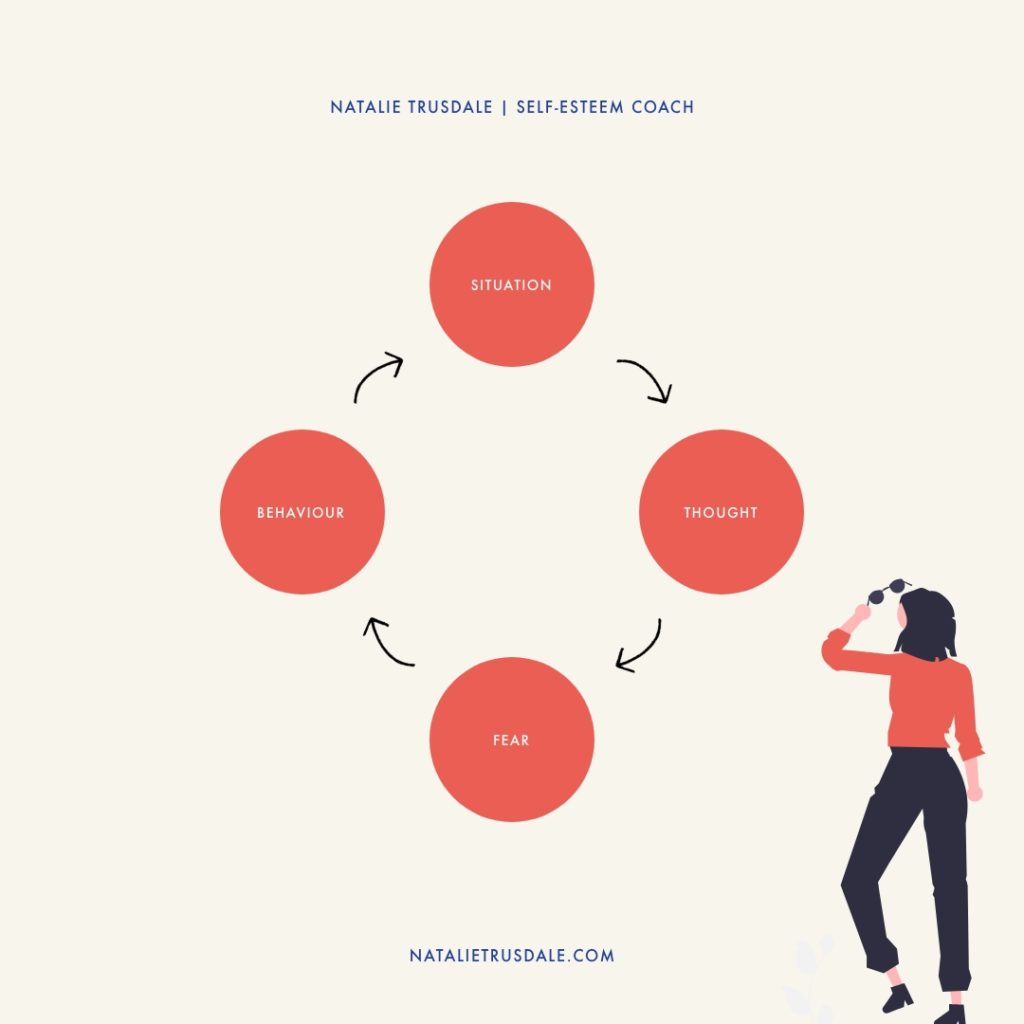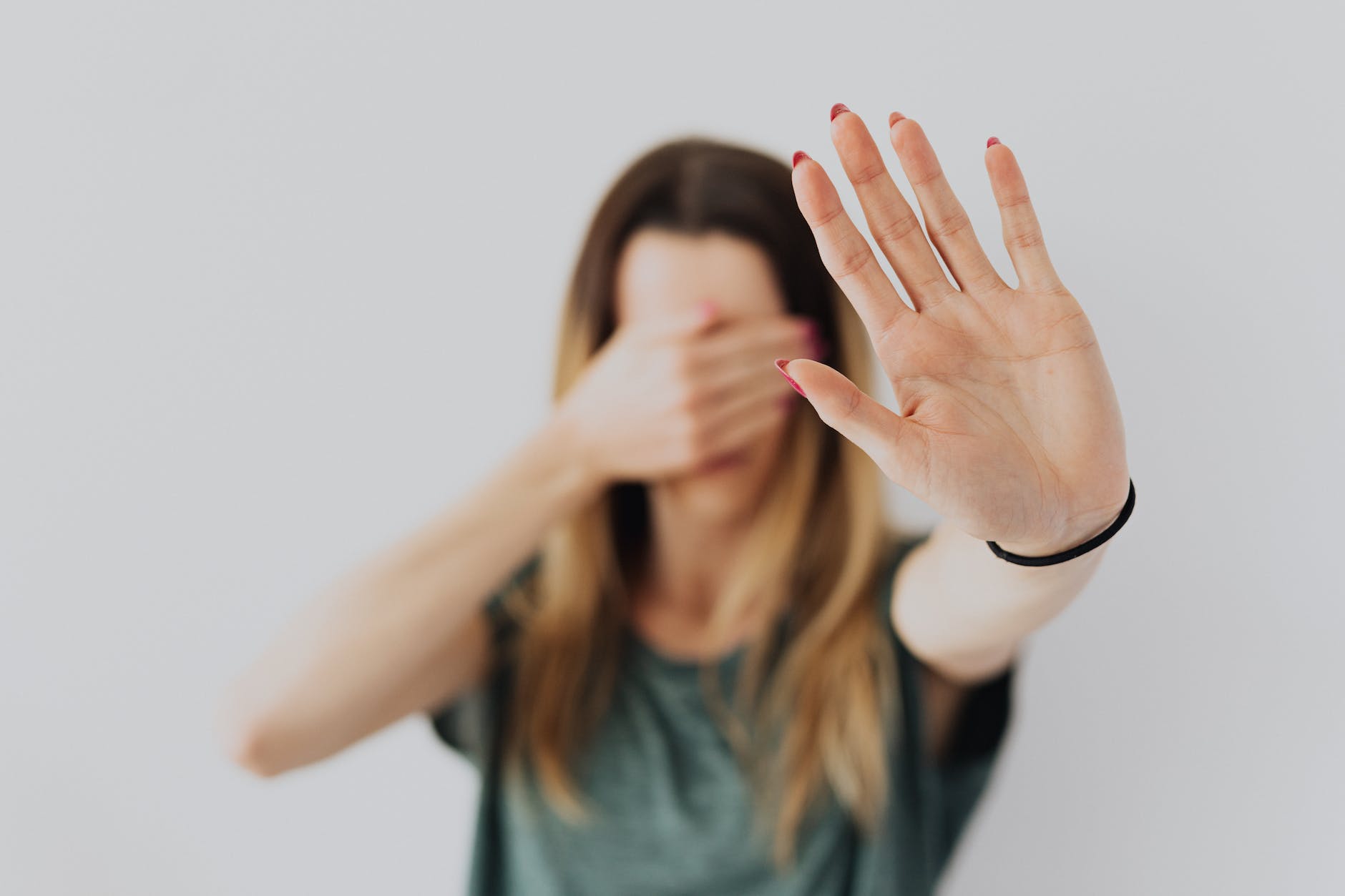Fear is a normal human emotion that helps you recognise danger and basically ‘survive’. However it can also be crippling and rather than be beneficial, might actually be holding you back from making changes and achieving your goals.
We all experience fear, but in today’s world rather than helping you survive predators and live. Fear looks different for everyone and influences the decisions you make. While fear might not be dangerous, it will never result in a healthy and fulfilling life if it’s controlling you.
Today’s post is about types of fear, how you might be stuck in a fear cycle and give you ideas of how to start facing your fears and thrive rather than simply survive.
Types of fear
Fear can pop up in different ways and for different reasons. Here are 5 common types of fear that you might be experiencing:
- Uncertainty – when you’re trying something new or facing a situation where you aren’t sure of the outcome, you might feel uncertain, which can lead you to fear the outcome and therefore not take action as a result.
- Judgement (others and ourselves) – a big fear comes from worrying about receiving judgement or negativity from others. But you may also hold judgement towards yourself, make assumptions or be plagued with self criticism. As humans we want to ‘fit in’ so the fear that others may not see us or what we do in a positive light can keep us trapped.
- Change – As much as you might not want yourself or things to stay the same, you can also feel worried about change. When you make changes, as well as perhaps dealing with the fear of uncertainty, you can fear having to adapt, how people may react, the effort needed to make the change and whether the changes are the ‘right’ thing for you to do. We are creatures of habit so change is a real and powerful fear.
- Rejection – One of the most powerful fears that holds us back is the idea that people around us, whether that’s a family member or stranger will reject us. Perhaps they won’t understand the changes you’re making, they won’t be supportive and might even not be happy with what you’re doing, how you’re changing and where you’re heading. This can be for various reasons, mainly their own fear that they are being ‘left behind’ or maybe you making changes also impacts their lives and they don’t want change. So you hold yourself back in order to keep others happy.
- Failure – What if you try to make a change and ‘fail’? How would you feel? What will people say about you?. Often the fear that we won’t be able to do something stops us even trying or perhaps you do try but don’t fully commit to the change and therefore it ends up being a self fulfilling prophecy that it doesn’t work out as you wanted.
How fear holds us back
Whatever the reason for your current feelings of fear, I can bet that it’s holding you back.
Through my personal experience and after supporting hundreds of women also struggling to make changes due to fear, there are many ways that fear holds us back from feeling and living how we want.
Fear impacts how you feel, see and think about yourself and your abilities, plus how you interact with the world around you.
If you want to make changes then you need to believe in yourself, but fear creates self doubt that may stop you taking action, leading to an endless cycle of learning, but not moving forwards.
Fear can lead you to feel negative and in a state of pain, resulting in unhealthy behaviours that give you small moments of pleasure or release, such as dieting, over exercising, arguments or isolation. These may feel good or take the ‘pressure off’ for the moment but cause more harm in the long term.
There are so many ways that fear holds us back and can result in negative well being and affect your life, so why can’t we let it go?
The Fear Cycle
Fear is an emotion that we create, I know you might be thinking “why would I create a fear that’s holding me back, I don’t want to feel it”. Although you may not want to feel fear, your thoughts create it. That is why one person may feel fear towards a certain situation, while someone else doesn’t.
This isn’t your fault or something you do intentionally, you just get stuck in a cycle just like the one below.

In real life that might show up for you by looking in the mirror (situation) and then having the thought “I look horrible, these clothes make me look fat”. If you’re due to go to a party that night you might then fear that people will also think you look fat, make negative comments or judge your appearance. This leads you to either avoid going to the party or going and feeling uncomfortable all night (behaviour). Both of these behaviours will lead you to feel unhappy and reinforce your negative thoughts, meaning that next time you look in the mirror, you’ll remember what happened last time and have the same thought again, and so the cycle continues.
Or perhaps you make a mistake at work (situation) and tell yourself “I’m so stupid” (thought). This makes you worry that your boss will find out and think you’re bad at your job (fear), as a result you either try to hide the problem, which ends up making it worse or you become quiet at work and don’t put yourself forward for projects or promotions (behaviour). This behaviour creates the belief that you aren’t good at your job and reinforces this cycle every time something doesn’t go right.
When you get stuck in a fear cycle nothing changes, it not only holds you back from making changes and achieving your goals, but slowly damages your self esteem.
How to start facing your fears
We can’t eliminate all fear, and neither would we want to. What you can learn is how to start to become aware of your fears, face them and move forward in spite of them.
Here a few ways to start facing your fears:
Become aware of when and why fear is showing up
First I want you to realise that feeling fear is normal and it happens to us all. Once you’re able to identify when fear is happening and why it’s happening then you are armed with the ability to move past it.

When you feel fear ask yourself:
- What am I really afraid of?
- Am I trying to protect myself from a particular outcome?
- Do I feel confident in achieving the outcome?
- What is on the other side of the fear?
Your answers to these questions will help you to get honest and clear about what’s truly coming up for you in that moment and put you in an empowered place to allow you to take action. You can learn a lot from your fears.
Reframe your fears
Often fears are a result of being afraid of losing something that we really want or love. This could look like feeling fear of uncertainty as a result of a desire to feel in control or a fear of the future due to a negative projection of what our future looks like.
So a great way to face your fears is to reframe them. Reframing your fears means looking at them in a different way.
Reframing can take a while to get the hang of and you have to be deliberate in doing it and self-compassionate along the way, but it will get easier.
Here are a few matras you can tell yourself when fear pops up to help you reframe them:
- The problem i’m facing needs to be faced to be able to achieve what I want
- This fear tells me how important this change is
- Fear isn’t real, it’s simply my brains reaction to change
- Fears is a sign of exciting things to come
Reframes are powerful, give them a go next time you’re feeling the fear.
Think about the positive “what if’s”
Often when we feel fear we default to the negative “what if’s”. What if it goes wrong, what if I look stupid, what if they judge me…..
The negative what if’s are endless and our brain has a field day with them!

So a great way to counter them is to start to think about the positive “what if’s” instead. What if it all goes to plan, what if everyone around me is really supportive, what if all my hard work pays off, what if nothing bad happens or maybe even what if I enjoy myself.
Positive “what if’s” are really powerful and you have no idea of the outcome, so why not start to think about the best case scenario rather than the worst.
Eliminating fear isn’t the goal
I encourage you to start telling yourself my biggest fear is staying the same. None of us can completely eliminate fear from our lives, but you can feel fear less and learn to manage your fears, stopping them controlling your decisions and actions (or inaction).
Remember that your fear’s are simply thoughts, they aren’t a sign that you can’t do something or that you shouldn’t do something. Be compassionate with yourself and learn to face your fears and your opportunities and outcomes are unlimited.
Let me know in the comments what fears are holding you back at the minute?

Hey I’m Natalie, Supporting women like you on their road to self-acceptance and building a positive body image.
View comments
+ Leave a comment